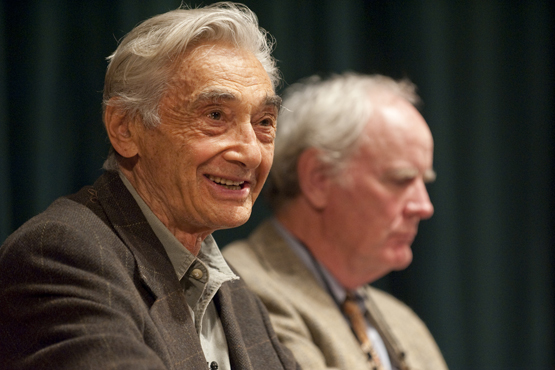Howard Zinn Dies
Historian, author, inspiration of political left succumbs to heart attack

Howard Zinn, an author, a history professor, and a political activist, whose writings changed the lives and minds of BU students and readers around the world, died of a heart attack yesterday in Santa Monica, Calif. He was 87.
Zinn taught in the College of Arts & Sciences political science department for 24 years, from 1964 to 1988. He was a hero of the political left, a consistent and cogent critic of American policies, domestic and foreign. He is best known for his book A People’s History of the United States (1980), which defied the notion that history is defined and written by and for “the winners.” A television documentary released last year, The People Speak, translated Zinn’s work to the screen for yet another generation of progressive thinkers.
Caryl Rivers, a College of Communication professor of journalism and one of the famous BU Five, a group of faculty who with Zinn refused to cross a University picket line in 1979, says that even though Zinn hadn’t taught here for many years, his death would change BU forever.
“He was such a righteous man,” says Rivers. “He was such a gentleman, a wonderful scholar; he had such charm and such erudition. He will be sorely missed.”
Joseph Boskin, a CAS professor emeritus of history and a close friend of Zinn’s, describes his death as “a loss for the entire country.”
“Howard will be hard to replace as a political figure, a sterling individual, and as a person of vision,” Boskin adds. “Also, as a person of guts.”
BU President Robert A. Brown describes Zinn as “an iconic writer and educator who impacted generations of students at Boston University.”
“Hopefully,” says Brown, “his spirit will live on at the University through the Howard Zinn Lecture Series in the College of Arts & Sciences, which has been established by grateful and admiring students.”
National Book Award winner James Carroll, a Boston Globe columnist and former University chaplain, says he is crushed by Zinn’s death.
“What a helluva last act he had,” he says. With the documentary, which was produced by Matt Damon, among others, “he became beloved by yet another generation of people. It’s astounding for a man of his time and the length of his days to still be doing what he was doing at BU so many years ago: offering young people a vision, a way to see the world.”
In October 2009, speaking at the Howard Zinn Lecture Series, with Zinn, Ellen Goodman, and Mary Gordon, Carroll said that during his early years at BU, he was one of those who sat in, without permission, on Howard Zinn’s history lectures. “In those lectures I heard a language,” he said. “I heard a rationale, an ethical argument that defined the feelings I was having, and enabled me eventually, still timidly, to claim them as my own.”
Alex MacDonald (CAS’72), a former student of Zinn’s, and his wife, Maureen A. Strafford (MED’76), made the gift that endowed the annual Howard Zinn Lecture Series.
“Howard Zinn’s teaching style was a dynamic one: that students should learn history in the classroom, but also make history in the public square, on the Ellipse in front of the White House, on a packed Boston Common, and on the sidewalks of Commonwealth Avenue,” says MacDonald.
Zinn grew up in a working class family in New York City, and at 18 landed a job as an apprentice shipfitter at the Brooklyn Navy Yard. At 21, he enlisted in the U.S. Air Force and flew combat missions in Europe during World War II. Following college and graduate school, he became chairman of the history and social sciences department at Spelman College, in Atlanta, where he was active in the civil rights movement and encouraged African-American students to fight racial discrimination. Soon students were challenging the restrictions they faced, and the administration viewed Zinn as “an instigator rather than supporter,” he wrote in his 1994 autobiography. In 1963 the college fired him for insubordination.
He joined BU’s political science department in 1964, at the beginning of the anti–Vietnam War movement. “War is not complicated,” Zinn said. “War is simple. It’s like a drug. It’s like crack. You get a high from victory in war . . . My conclusions about war led me to become an activist against the war in Vietnam and to write about the nature of war.”
His tenure at BU was marked by crowded lecture halls and legendary clashes with the administration, as well as teach-ins, debates, and rallies. He testified for the defense at the 1973 Pentagon Papers trial of his friend Daniel Ellsberg. He retired from BU in 1988.
Zinn leaves a daughter, Myla Kabat-Zinn, of Lexington, a son, Jeff, of Wellfleet, three granddaughters, and two grandsons.
“There’s plenty to say about my dad,” says Jeff Zinn, “but other people can say it better. I’ll just say he was a great father and I loved him very much.”
Get the Flash Player to see this media.
In the video above, taken from his last public appearance at Boston University, in October 2009, Howard Zinn offers President Barack Obama some advice.
Comments & Discussion
Boston University moderates comments to facilitate an informed, substantive, civil conversation. Abusive, profane, self-promotional, misleading, incoherent or off-topic comments will be rejected. Moderators are staffed during regular business hours (EST) and can only accept comments written in English. Statistics or facts must include a citation or a link to the citation.